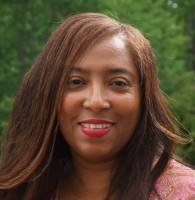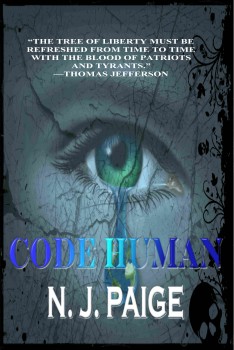Code Human by N. J. Paige
As most of our readers know, the young adult category for fiction is booming, and the thriller genre is no exception to the trend. Centered on teen protagonists, the popularity of blockbusters like Twilight and The Hunger Games has enabled such books to expand far beyond the original target audience and create fresh, exciting possibilities for authors to explore ,and readers to enjoy.
In CODE HUMAN, author N.J. Paige offers readers a glimpse into a future red in tooth and claw, where oppression reigns, yet resistance will never be considered futile by those willing to fight. The Big Thrill recently caught up with Paige to talk with her about her most recent work.
Congratulations on your latest novel and thank you for taking the time to join us. Tell us about CODE HUMAN. What aspect of this book do you think readers of The Big Thrill will find most appealing?
First of all, thanks for having me. To answer your question, I think the interesting characters such as the Shillers, the Purestkind, Rubrics, and the Besmirchians may appeal to readers because of their unique physical characteristics. Also, the main character, Fenesia, although she loses her innocence when she makes her first kill, she questions the morality of it. And she questions the morality of Purest’s treatment of the Underkind, which includes the Shillers, Besmirchians, Rubric, as well as disgraced Purestkind, such as Fenesia.
Both your novels involve teenage protagonists. What is it about the young adult market that interests you? And what do you find the most challenging about writing youthful characters?
It may be because I have two teenage children—a son and daughter. Watching them grow has been interesting and wonderful―the changes they go through, not to mention the many challenges.
I have to say, the most challenging thing to write about young characters is being careful about the intimate, sexual situations I place them in. For example, in Rise Of The Nephilim: Fire And Blood, I bring the main character, Maxine to a point where she is stripped of almost all of her clothes, but I pull her away before she completely gives herself to the man she loves, who happens to be an angel. In CODE HUMAN, Fenesia talks about going all the way. She even experiences wild emotions stirring through her, but I never bring her to that place where there’s no turning back. I don’t know; maybe it’s my Catholic upbringing bearing down on my conscience.
CODE HUMAN is set in a futuristic, dystopian society. Did you choose this as a way of warning readers about a future you fear? Or do you see this type of setting as providing a more fantastic world to explore your characters and show how they handle adversity?
I would have to say both. After so many decades, we still have so much prejudice and divisiveness when it comes to race and all the other differences between us when in reality, our differences are merely just a matter of natural science―the chemical make-up of our skin, our sexual orientation, all other natural characteristics. Without these differences, I don’t think that we could survive as humanity.
I place the setting in a dystopian society to demonstrate that if we don’t get it together, we’ll still be fighting these battles centuries from now.
Dystopian novels can be dark and pessimistic, as one would expect, but often they can showcase examples of the indomitable nature of the human spirit. Where on the optimistic/pessimistic scale would you place your book?
I would place CODE HUMAN in sixth place. Yes, most of the book is pessimistic; however, I do try to balance it out with opportunities for hope. For example, the militias are made up of all races―Rubrics, Besmirchians, Shillers, and Purestkind. And they do try to help each other in spite of their differences.
What sort of research did you do for CODE HUMAN? Do you find it more difficult to research for a futuristic novel than for a historical or modern one?
Well, for one thing, I’m addicted to cable news. I mean, there are lots of examples there about human conflict. I also looked back at our history and the many examples of human suffering.
If I was writing a historical novel, I think that it would be more challenging because, although the characters would be fictional, the occurrences and when they happened would need to be factual. So, that would involve precise research. I do hope to write a historical novel sometime in the future.
What can readers look forward to from you going forward? Is there a sequel to CODE HUMAN in your future?
Yes, absolutely. This is a series. I’m currently working on book number two. I’m also working on the second novel for for Rise of The Nephilim.
*****
 N. J. Paige lives in Pennsylvania with her husband and two children. Her favorite motto is “Life is a journey best taken one step at a time.” And one of her favorite pass-time activity is to hike through her local forest, where she gets inspiration from Tree-sprites.
N. J. Paige lives in Pennsylvania with her husband and two children. Her favorite motto is “Life is a journey best taken one step at a time.” And one of her favorite pass-time activity is to hike through her local forest, where she gets inspiration from Tree-sprites.
To learn more about N. J. Paige, please visit her website.
- The Prisoner’s Gold by Chris Kuzneski - September 30, 2015
- Code Human by N. J. Paige - May 31, 2015
- Lucky Chance by Linell Jeppsen - April 30, 2015

